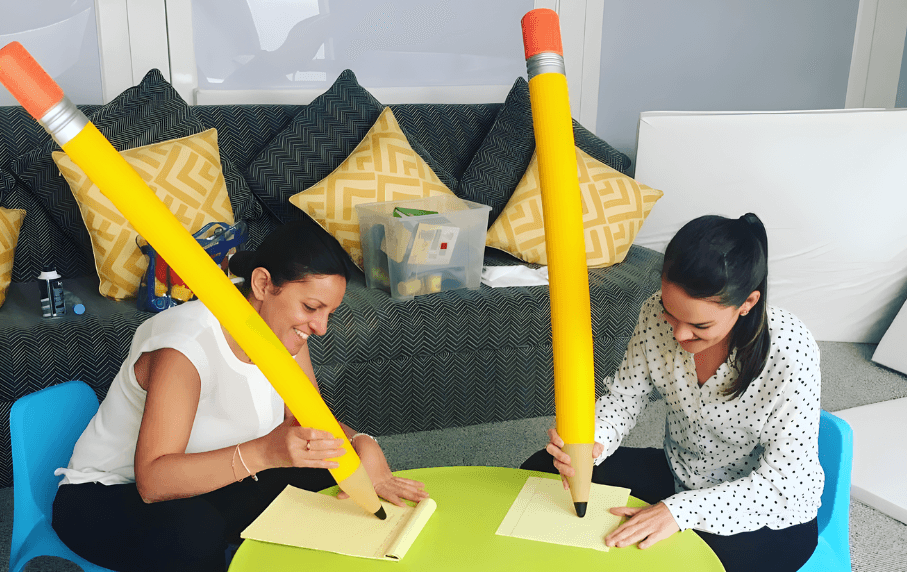
Even if your child has not been diagnosed with specific speech language challenges, as a parent or guardian, you are the person who knows best if he or she would benefit from speech and language therapy. With that in mind, there are a number of ways for you to reinforce the work your child is doing in therapy to help build your child’s communication skills; or things you can do in the interim if you are waiting for an assessment.
Language building is essential during the first years of a child’s life, as this is when most of the pathways for developing speech, language and cognitive skills are formed. By doing all you can at home to enhance your child’s training and strengthen their language skills, you will make their learning curve much easier.
If you have a child who is struggling with delayed speech or language (or both), it’s important to encourage activities in the home that offer stimulation and promote opportunities to foster developing these skills. Kids actually begin to learn and comprehend words and phrases long before they utter their first words. Parents and caregivers are crucial components to the success of early speech and language building skills – and the earlier this happens, the better.
Yet, without the training of a speech and language therapist, how do you do this for your child?
Here are five tips you can include in your daily routine to provide support for your child’s speech development and encourage language building skills:
Have regular storytelling sessions with your child. When reading a story to younger children, always make declarative statements, point out the facial expressions of the characters, and link what is in the book to songs or experiences.
With older children, instead of asking Yes or No questions, think about asking open-ended, thought-provoking questions, such as: “What would you do if you saw a great big Dinosaur in your garden?” By asking questions that elicit a detailed response, you are encouraging your child to express his or her ideas without the fear of being right or wrong.
Teaching listening skills is important for the development of speech and language skills for every child. Children with auditory processing difficulties though, often have a great deal of difficulty with their listening skills.
Games like “Simon Says” or “We went on a picnic and brought…” can be useful to teach following instructions and auditory memory skills. The game of “Telephone” is a wonderful way to engage with and teach your child to listen to your words and relate them to another person. This can be particularly fun when silly words are introduced as you really have to listen carefully!
If you can’t remember the game, here is how you play: Have your child and friends or siblings get into a circle. One person whispers a word to the other and that person whispers that word to the next person. The goal of telephone is to end up with the same ending phrase as the starting phrase.When your children are talking to you, offer thoughtful responses so that you validate their choice of language, as well as their ideas and feelings. They want to feel like they are being heard, as we all do.
Reading is one of the most important things you can do with your child, especially when done as a family activity. Ask questions about the pictures; ask your child to point to items on each page and, for older children, you may ask your child to think of experiences he or she may have had that are similar. All these help your child make connections with what he or she is hearing.
You may find that your child wants to read the same book time and time again. Hearing the same story repeatedly helps foster familiarity and security, while at the same building their language skills.
Toddlers especially learn best when the experience is not just interactive, but also fun. Your child will not respond as well if he or she feels like you’re making them do “homework.” Instead, call your play time with your child “special time” something your child will look forward to and will want to actively participate in.
The quality time you spend playing and supporting your child’s speech and language is more important than the amount of time spent. Even 10 minutes of special time with your child, five times per week, can make a huge difference to how well and quickly they learn. Encourage your child to choose the game or toys they would like to play with during this time.
Of course, there are many more tips to help you reinforce speech and language therapy at home with your child, far too many than can be offered in a blog post. Yet, this subject is also too important not to explore. If you’re wanting a bit more depth and understanding on how you can help young children with special needs learn to talk and communicate better, click here for my free handout: Tips to Encourage Expressive Language.
You can also learn the difference between talking and communicating with your child by reading this blog post.